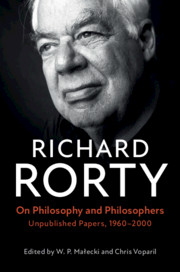Book contents
- On Philosophy and Philosophers
- On Philosophy and Philosophers
- Copyright page
- Contents
- Acknowledgments
- Note on Sources
- Introduction: Rorty as a Critical Philosopher
- I Early Papers
- 1 Philosophy as Ethics
- 2 Philosophy as Spectatorship and Participation
- 3 Kant as a Critical Philosopher
- 4 The Paradox of Definitism
- 5 Reductionism
- 6 Phenomenology, Linguistic Analysis, and Cartesianism: Comments on Ricoeur
- 7 The Incommunicability of “Felt Qualities”
- 8 Kripke on Mind-Body Identity
- II Later Papers
- Index of Names
5 - Reductionism
from I - Early Papers
Published online by Cambridge University Press: 10 October 2020
- On Philosophy and Philosophers
- On Philosophy and Philosophers
- Copyright page
- Contents
- Acknowledgments
- Note on Sources
- Introduction: Rorty as a Critical Philosopher
- I Early Papers
- 1 Philosophy as Ethics
- 2 Philosophy as Spectatorship and Participation
- 3 Kant as a Critical Philosopher
- 4 The Paradox of Definitism
- 5 Reductionism
- 6 Phenomenology, Linguistic Analysis, and Cartesianism: Comments on Ricoeur
- 7 The Incommunicability of “Felt Qualities”
- 8 Kripke on Mind-Body Identity
- II Later Papers
- Index of Names
Summary
In “Reductionism,” Rorty takes up the question “Can we abandon reductive analysis as a method of philosophical discovery and still keep the intellectual gains which have accrued from its employment as a method of deciding what questions to discuss?” Rorty uses the notion of reductionism to both present a synoptic vision of the history of Western philosophy and put forward an original metaphilosophical position. After presenting the twentieth-century program of reductive linguistic analysis as a mature form of the seventeetn century’s “reductionist conception” of the goal of inquiry, he examines J. O. Urmson’s arguments, ultimately finding that Urmson falls short of applying reductive analysis to the technical vocabularies of philosophers. Even though Rorty agrees with Urmson that most reductive analyses, judged by their own standards, are unsuccessful, Rorty nevertheless thinks a basis for distinguishing useful from useless analyses is possible. We also see here Rorty’s early interest in eliminability, which shortly thereafter becomes the basis for a distinctive contribution.
- Type
- Chapter
- Information
- On Philosophy and PhilosophersUnpublished Papers, 1960–2000, pp. 80 - 108Publisher: Cambridge University PressPrint publication year: 2020



